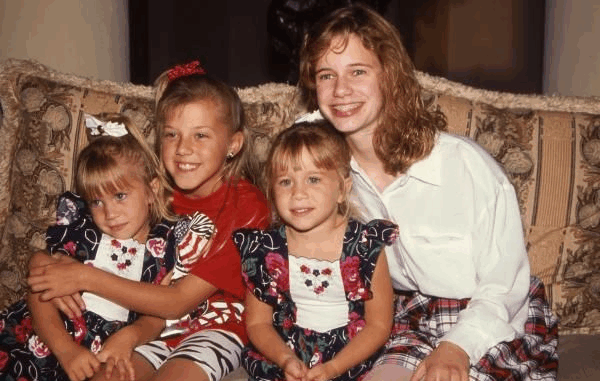
The Life Lessons and Deeper Themes in Full House You Might Have Missed
Full House wasn’t just a feel-good sitcom about a widowed dad raising his three daughters with the help of his brother-in-law and best friend. Beneath the surface of catchy theme songs and laugh tracks, the show delved into profound life lessons and explored deeper themes that resonated with viewers of all ages. Let’s revisit some of the most impactful messages that Full House imparted, often subtly, throughout its eight-season run.
Redefining Family Dynamics
One of the most groundbreaking aspects of Full House was its portrayal of non-traditional family structures. The show presented a single father, Danny Tanner, who balanced his career and parenting with the support of his brother-in-law Jesse and best friend Joey. This dynamic challenged the conventional notion that caregiving was solely a mother’s role, showcasing that fathers could be nurturing and emotionally available.
Challenging Gender Roles
Full House also made strides in challenging gender stereotypes. Characters like Danny, Jesse, and Joey demonstrated that men could be sensitive, expressive, and involved in domestic duties. This portrayal helped to break down the rigid gender roles prevalent in the media at the time, offering a more inclusive representation of masculinity.
Addressing Grief and Loss
The loss of a mother at a young age is a central theme in Full House. The show addressed the complexities of grief through the eyes of the Tanner sisters, highlighting the importance of family support in navigating such profound emotions. Episodes like “The Last Dance” and “The Graduates” poignantly depicted the healing process, teaching viewers that it’s okay to grieve and that healing takes time.
Promoting Emotional Intelligence
Throughout the series, characters frequently engaged in open conversations about their feelings. Whether it was Danny discussing his emotions with his daughters or Joey offering advice, Full House emphasized the importance of emotional expression and communication. This focus on emotional intelligence encouraged viewers to value their feelings and seek support when needed.
Teaching Responsibility and Consequences
Many episodes centered around the characters learning about responsibility and facing the consequences of their actions. For instance, in “The Volunteer,” DJ volunteers at a senior citizen home and befriends a patient with Alzheimer’s, teaching her the value of empathy and responsibility.
Highlighting the Importance of Education
Education was a recurring theme in Full House. Characters like DJ and Stephanie faced academic challenges that underscored the value of learning and perseverance. Episodes such as “Be True to Your Preschool” and “The Test” illustrated the pressures and rewards of academic achievement, promoting a positive attitude towards education.
Exploring Peer Pressure and Personal Integrity
Full House didn’t shy away from depicting the challenges of peer pressure. Episodes like “Shape Up,” where DJ struggles with body image issues, and “Silence Is Not Golden,” where Stephanie learns about the importance of speaking up against abuse, highlighted the significance of personal integrity and the courage to make the right choices, even when it’s difficult.
Embracing Diversity and Inclusion
The show occasionally touched on themes of diversity and inclusion. For example, in “Girls Will Be Boys,” Michelle grapples with gender expectations, teaching viewers that it’s okay to defy traditional gender roles and be true to oneself.
Modeling Healthy Relationships
Full House showcased various forms of healthy relationships, from the sibling bond between DJ, Stephanie, and Michelle, to the romantic relationships of Danny, Jesse, and Joey. These portrayals emphasized respect, communication, and mutual support as the foundations of strong relationships.
Instilling Values of Kindness and Compassion
Acts of kindness and compassion were prevalent throughout the series. Whether it was helping a friend in need or showing empathy towards others, Full House reinforced the importance of treating others with kindness and understanding.
Encouraging Personal Growth and Self-Acceptance
The characters’ journeys often involved personal growth and self-acceptance. Episodes like “Nerd for a Day,” where Stephanie learns to embrace her individuality, and “Shape Up,” where DJ learns to love her body, encouraged viewers to accept themselves and strive for personal development.
Demonstrating the Power of Humor in Healing
Humor was a vital tool in Full House for addressing serious topics. The show’s ability to blend comedy with poignant moments allowed it to tackle sensitive issues without diminishing their significance, demonstrating that humor can be a powerful means of coping and healing.
Promoting Family Unity
Despite the challenges and conflicts the family faced, Full House consistently highlighted the importance of family unity. The characters’ unwavering support for each other, even in the face of adversity, underscored the message that family is a source of strength and comfort.
Conclusion
Full House was more than just a sitcom; it was a platform that addressed complex themes and imparted valuable life lessons. Through its portrayal of diverse family dynamics, emotional intelligence, personal integrity, and the importance of kindness, the show left an indelible mark on its audience. Even years after its original run, the lessons from Full House continue to resonate, reminding us of the enduring power of love, family, and personal growth.
Frequently Asked Questions (FAQs)
1. What life lessons did Full House teach?
Full House taught lessons on emotional intelligence, the importance of family support, personal integrity, and the value of education, among others.
2. How did Full House challenge gender roles?
By depicting male characters like Danny, Jesse, and Joey as nurturing and emotionally expressive, the show challenged traditional gender stereotypes.
3. Did Full House address real-life issues?
Yes, the show tackled topics such as grief, peer pressure, body image, and personal responsibility, often through its “very special episodes.”
4. What impact did Full House have on viewers?
Full House provided viewers with relatable scenarios and life lessons, fostering a sense of connection and understanding.
5. Is Full House still relevant today?
Absolutely. The themes of love, family, and personal growth are timeless, making Full House as relevant today as it was during its original run.
